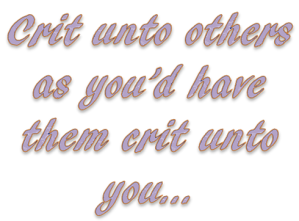For some writers the idea of allowing
anyone to read their writing is more than they are willing to do. For other
writers the idea of not having at least one critique partner look over and comment
on their work is unthinkable. Perhaps you love critiques and want to have as
many people as possible read and critique your work or maybe you fall someplace
in the middle.
I fall into the middle category—although
in the beginning I spent time in each of the other categories. I currently have
three critique partners, and I believe without feedback from the various
writers who’ve mentored me over the years, I never would have been published.
God has blessed me with wonderful mentors almost from the beginning of my
writing journey and they’ve taught me with love and patience even when I didn’t
want to hear that I needed to keep working.
Although the critique groups I’ve been
in have changed through the years, I’ve have the privilege of having one critique
partner in particular virtually from the beginning. I’ll be the first to tell
you I don’t always care for what she has to say. In fact, sometimes I’m
downright annoyed, but I know that she has me and my story’s best interest in
mind, so I sit back and chew on what she’s said. Yes, I’ve vented to my patient
hubby more than once, but after taking time to think about her comment or
suggestion I begin to see her point.
That is not to say a writer must take
all critique comments and incorporate them into their work—ultimately it’s your
story and no one knows it better than you. What I am saying is that there is
value in critiques, and we as writers should be willing to learn from the
people we’ve chosen to work with.
We need to be open to correction and
instruction and not allow our feelings to be hurt when someone doesn’t agree
with us, or suggests we didn’t hit the mark. Keep in mind our critique partners
are there to help make our baby the best it can be, and if there is any doubt
about their motivation perhaps it’s time to find a new critique partner.
If you’ve never allowed anyone, much
less another writer to see your work, I encourage you to find a trusted writer
friend that will be honest and fair to give you feedback. How else will you
know if what you’ve written hits the mark?
Finally, critique partners can be so
much more than what the word implies. They can be prayer partners, advisors,
friends, brainstorming partners, cheerleaders, and a shoulder to cry on when
the rejections come. We writers live a somewhat solitary life, and we need each
other for encouragement as much as for help with our writing.
About Kimberly:
Kimberly married her college
sweetheart and is a graduate of Northwest University. She lives in the Pacific
Northwest with her husband, two teenage sons and their yellow lab. Kimberly is
an avid reader and loves romance, suspense and romantic suspense. She enjoys
playing the piano, hiking and coffee with friends. She loves hearing from her
fans. You can connect with her on her website at http://kimberlyrjohnson.com/
About Kimberly's New Release:
Susan Hill isn't ready to forgive.
The small-town CPA can't forget how Blake Mitchell jilted her and left their hometown without an explanation. But when her first love returns to Leavenworth, the ruggedly handsome writer evokes conflicting emotions, especially when Susan meets the child she assumes is his daughter.
Since his parents' deaths six years ago, Blake's been raising his little sister on his own. But he's never forgotten the woman he left behind. Now, he can't undo the past, but maybe he can change the future…if he can convince Susan to give him one more chance.
Purchase A Romance Rekindled at:
Tweetables:
Critique partner: Nice...or nightmare? Kimberly Rose Johnson shares her thoughts on Write Right! http://tinyurl.com/ncdevmv
Does the thought of a crit partner give you hives? Relax
with Kimberly Rose Johnson on Write
Right! http://tinyurl.com/ncdevmv




